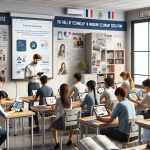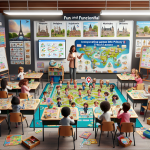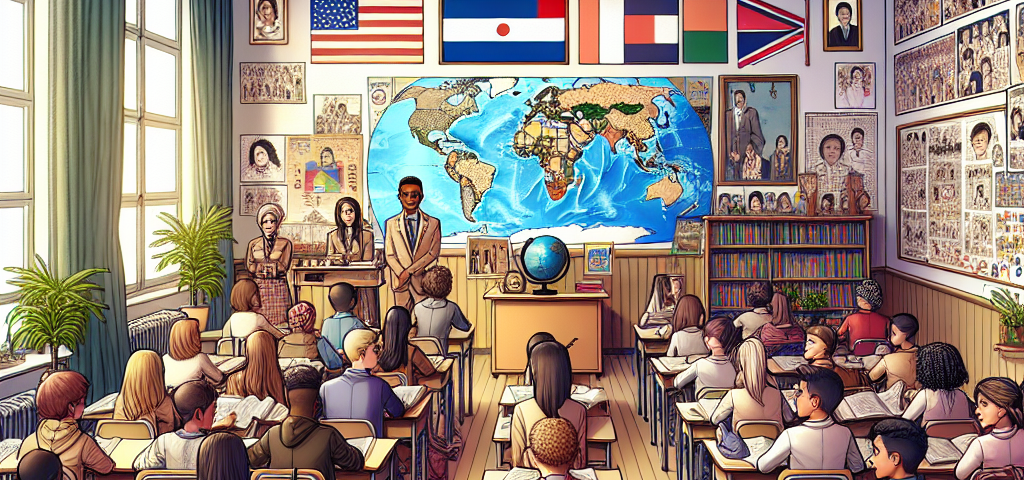
The Role of Technology in Modern French Secondary Education
May 31, 2025
Fun and Functional: Incorporating Games into Primary French Lessons
May 31, 2025
In an increasingly interconnected world, the role of education extends beyond academics; it encompasses the formation of globally-minded citizens. French secondary schools have long recognized this imperative, intertwining cultural enrichment within their curricula to equip students with the skills necessary for global citizenship. This article explores the methodologies and practices in French secondary education that cultivate cross-cultural awareness, empathy, and social responsibility among students.
A Comprehensive Curriculum
French secondary education places significant emphasis on a well-rounded curriculum that integrates not only traditional subjects but also cultural education. The National Curriculum of France highlights the importance of languages and cultural history, ensuring that students engage with diverse perspectives. The studied subjects often include literature, geography, and history, allowing students to explore global themes, such as migration, colonialism, and international relations.
Language Acquisition
One of the cornerstones of fostering global citizenship in French secondary schools is the rigorous teaching of foreign languages. Students are typically required to study at least two foreign languages, often including English, Spanish, German, or even less commonly taught languages. Learning languages goes beyond mere vocabulary; it builds bridges to understanding different cultures, traditions, and worldviews.
Through language acquisition, students engage with authentic cultural materials—films, literature, music—encouraging them to appreciate the subtleties and complexities of foreign cultures. This linguistic competence is pivotal for students to navigate global dialogues and participate actively in multicultural environments.
Cultural Exchanges and Partnerships
French secondary schools often engage in international partnerships, creating platforms for cultural exchange that enrich the academic experience. These partnerships may entail student exchanges, collaborative projects, or virtual interactions with peers from different countries. Such initiatives allow students to experience firsthand the daily realities, values, and customs of other cultures, fostering empathy and understanding.
Educational Trips and Exchanges
Excursions abroad serve as impactful methods for cultural immersion. Whether visiting European cities rich in history or participating in exchange programs in global metropolises, French students gain exposure to diverse lifestyles and viewpoints. These experiences often challenge preconceived notions, encouraging students to reflect on their cultural identities while appreciating differences.
Extracurricular Activities and Clubs
In addition to the formal curriculum, extracurricular activities play a significant role in promoting cultural enrichment and global citizenship. Schools often sponsor clubs focused on international themes, such as Model United Nations, where students simulate diplomatic debates and tackle global issues. Such engagements foster critical thinking, collaborative skills, and an understanding of international relations.
Moreover, cultural festivals that celebrate various world traditions allow students to encounter and engage with diverse cultural expressions, from cuisine to music and arts. These events promote inclusivity and an appreciation for the vibrant tapestry of global cultures.
Digital Literacy and Global Citizenship
In today’s digital age, French secondary schools also emphasize the importance of digital literacy as a component of global citizenship. By incorporating technology into the classroom, educators prepare students to participate in global conversations and access information from various cultural perspectives. Social media campaigns, online forums, and collaborative projects with international partners enable students to engage in real-time discussions about pressing global issues.
Community Service and Social Responsibility
Encouraging students to engage in community service is another facet of fostering global citizenship in French secondary schools. Projects that involve local and international communities teach students about social justice, sustainability, and civic responsibility. By participating in volunteer work, students not only contribute to their communities but also develop a sense of agency and accountability towards the world at large.
Conclusion
French secondary schools play a vital role in nurturing global citizens through cultural enrichment initiatives that encompass a diverse and holistic educational approach. By combining a comprehensive curriculum with language acquisition, cultural exchanges, extracurricular activities, and community service, schools cultivate a generation capable of navigating and addressing global challenges. As societies continue to grapple with issues of inequality, environmental crises, and cultural clashes, the need for globally-minded citizens has never been more critical. Through the lens of education, French secondary schools exemplify how cultural enrichment can empower students to become responsible, empathetic advocates for a more interconnected and harmonious world.

